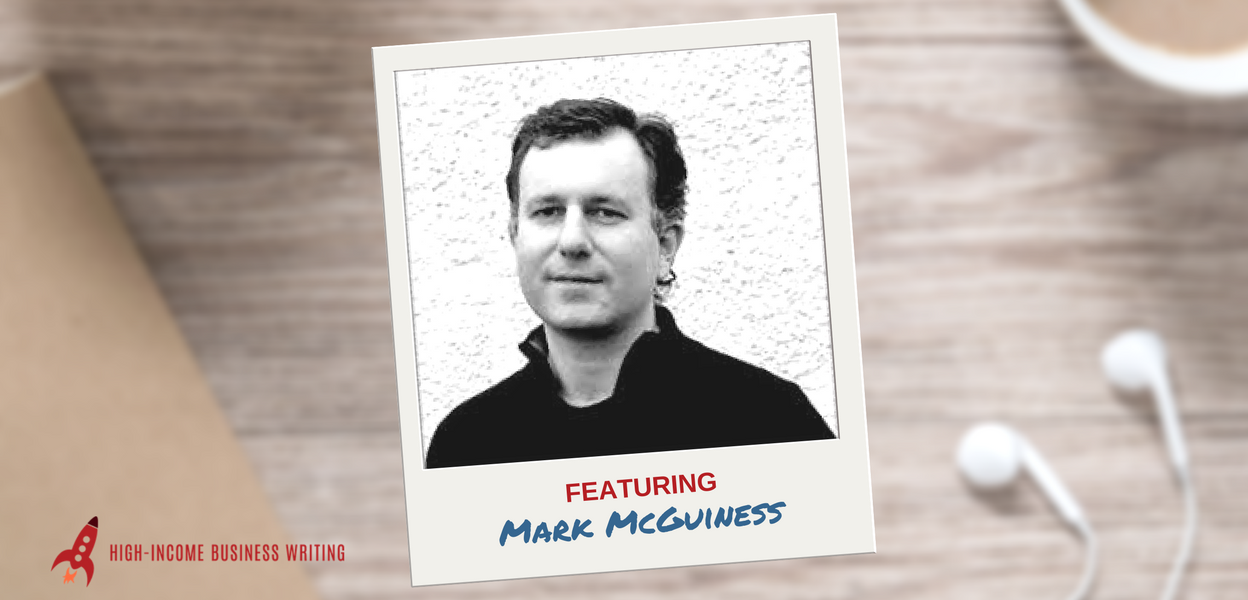Self-employment is both a blessing and a curse.
It’s a blessing because we get to chart our own course. We get to pursue projects and clients that are interesting to us. And we can adjust our workload and schedule however we want.
But that kind of freedom can also lead to lack of discipline and motivation if we’re not careful.
How do we stay on track? How do we find the motivation to do the work we know we have to do, even when we don’t feel like doing it?
My guest today is an expert on that topic. His name is Mark McGuiness. Mark is a business coach, trainer and consultant specializing in work with creative professionals, innovative companies and other trendsetters at the forefront of the Creative Economy.
He’s also the author of the new book Motivation for Creative People, a very talented poet and an all-around super guy.
Here’s what Steven Pressfield, bestselling author of The War of Art had to say about Motivation for Creative People:
“This is a ‘How To’ manual at the highest level from a man who has lived the life and has watched and worked intimately with hundreds of others who’ve done the same. Indispensable reading for anyone in a creative field who is seeking to achieve not just a flash of brilliance but a lifelong career.”
The notes that follow are a very basic, unedited summary of the show. There’s a lot more detail in the audio version. You can listen to the show using the audio player below. Or you can subscribe in iTunes to get this show delivered straight to the Podcasts app on your smart phone, tablet or iPod.
What is motivation?
Motivation is whatever gets you moving. It’s not a magic potion you need to ingest before conquering the world.
You can be motivated by different things. But if you rely on only one kind of motivation, it won’t sustain you. You need to find different kinds of motivation and combine them in a way so they complement each other.
How are motivation and creativity linked?
Studies show that intrinsic motivation (i.e. doing something for the love of it) is highly correlated to creativity. The more you focus on the sheer pleasure of your work (not outcome or money or what clients say), the more creative you’ll be.
But as a professional, you can’t ignore outcome or money or what the client says—and that may stifle your creativity. It’s a paradox.
If you’re a creative professional, you can’t ignore rewards. But rewards may kill your creativity.
Fortunately, you can find ways to combine the two so they support each other.
In your book, you talk about four different types of motivation. What are they?
1. Intrinsic motivation: Love of the work itself.
2. Extrinsic motivation: Rewards for the work, such as money, status and opportunity.
3. Personal motivation: Your core values as an individual.
4. Social motivation: Influence of other people.
Ideally, you want to use all four types of motivation. Most of us use some of them but not in a planned way.
How can we make sure we’re using all four of these motivations?
Conduct a motivational audit. Figure out how full (or empty) each category is. Ask yourself some questions:
- For intrinsic motivation: “Am I enjoying the work? How much?”
- For extrinsic motivation: “Am I making enough money?” “How is my professional reputation?” “Do I need to be more strategic?”
- For personal motivation: “What are my values?” “What motivates me?” “What are my priorities?” “Are there any conflicts?”
- For social motivation: “Do my clients/collaborators/business partners support me or hold me back?” “Am I attracting the right audience? How can I serve them better?”
Your answers will indicate the actions you need to take.
Often, you need two or more symbiotic activities to hit all four motivations. For example: a professor of literature who also writes fiction, or a copywriter who plays in a band on weekends.
‘Side’ activities are energizing. They nurture your creativity—which then spills into your work.
Can you share a few practical ideas to get ourselves going when we’re stuck?
- Draw a figurative circle around your desk. Some people have a tendency to keep researching when they should be writing. Challenge yourself to stay in the circle for two hours and write with what you have. See what you come up with. You may not finish the work, but you’ll make a solid start.
- Write “even though….” We all experience resistance. But you need to sit down and write “even though….” E.g. “I need to sit down and write even though I don’t feel like it.” “I need to sit down and write even though I feel stressed by this deadline.”
Steven Pressfield talks about this concept in The War of Art.
How can we use rewards without having them backfire?
You should think about rewards at two distinct points in time: before you commit to a project and every time you complete one.
Before you start a project:
- Look at your intrinsic motivation. How much is there? Is it enough?
- Look at your extrinsic motivation. How much money, opportunity, status, etc. will the project bring you. Is it enough?
If the project falls short on either of these measures, you need to either decline the opportunity or renegotiate.
Once you accept a project, dive in and get lost in the work.
At the close of the project:
- Go back and review. Did you get what you wanted out of the project? Is it the kind of thing you want to do again?
Tell us about your book
Mark McGuinness’s book is Motivation for Creative People: How to Stay Creative While Gaining Money, Fame and Reputation.
Written for creative professionals, it details how to stay motivated and creative while reaping the rewards of your creativity.
It’s available in print and e-book format.






